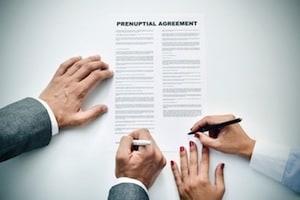of Experience
Matrimonial Law
Matrimonial law in New Jersey

If you wish to be married in New Jersey, it’s important to understand the state’s matrimonial laws.
If either member of the couple is a New Jersey resident, then the application for a marriage license must be made in the New Jersey municipality (city, borough, or township) in which either party lives.The marriage license will be valid throughout the State of New Jersey.
If neither member of the couple is a New Jersey resident, then the couple will need to apply for a marriage license in the municipality where the wedding will be performed, and the license will only be valid for that municipality.
Requirements for obtaining marriage licenses vary in each municipality.Thus, you should check with the location where you plan to be married to find out what days and time you can obtain a marriage license and whether you need to make an appointment and bring cash.It’s important not to leave this until the last minute before the wedding!
It’s also important not to get a marriage license too far in advance.A New Jersey marriage license is valid for only 30 days from the date it’s issued.
To obtain a marriage license, you will need to present a photo ID such as a driver’s license or passport, as well as certified copies of each party’s birth certificate.Parties who are US citizens will need to provide their Social Security numbers.
A person who is under 18 will need the permission of both parents in order to marry, and this permission must be given in front of two witnesses.Persons under 16 will need a court’s approval in order to marry.Special provisions apply when a woman is pregnant or when the couple already has a child.
If you’ve been married before, you’ll need to bring documentation to show that you’re no longer married, either because you’re divorced or because your former spouse has died.You’ll need to bring a certified copy of a final decree of divorce or a certified copy of the death certificate.
You will also need to bring along a witness who is over 18 when you go to apply for a marriage license.
Same-sex marriage has been legally recognized in New Jersey since October, 2013.
New Jersey does not recognize the concept of “common law marriage,” where a couple has lived together like a married couple but never obtained a marriage license or had a wedding.
The matrimonial and divorce laws that apply to married couples in New Jersey don’t apply to unmarried couples. However, when unmarried partners split up, one may be able to request “palimony,” which is similar to alimony . A palimony claim can also be brought against the estate of a partner who has died.
As of 2010, New Jersey law provides that an agreement to pay palimony is not valid unless:
- The agreement is in writing;
- It is signed by the person making the promise to provide financial support;and
- Each party received advice from his or her own family lawyer.
If you have questions about matrimonial law in New Jersey, we invite you to contact our Hackensack office for a free initial consultation with one of our experienced New Jersey family lawyers.
Call us today at (201) 345-5907 or send us an e-mail and let us help you with your New Jersey matrimonial law or divorce issue.




